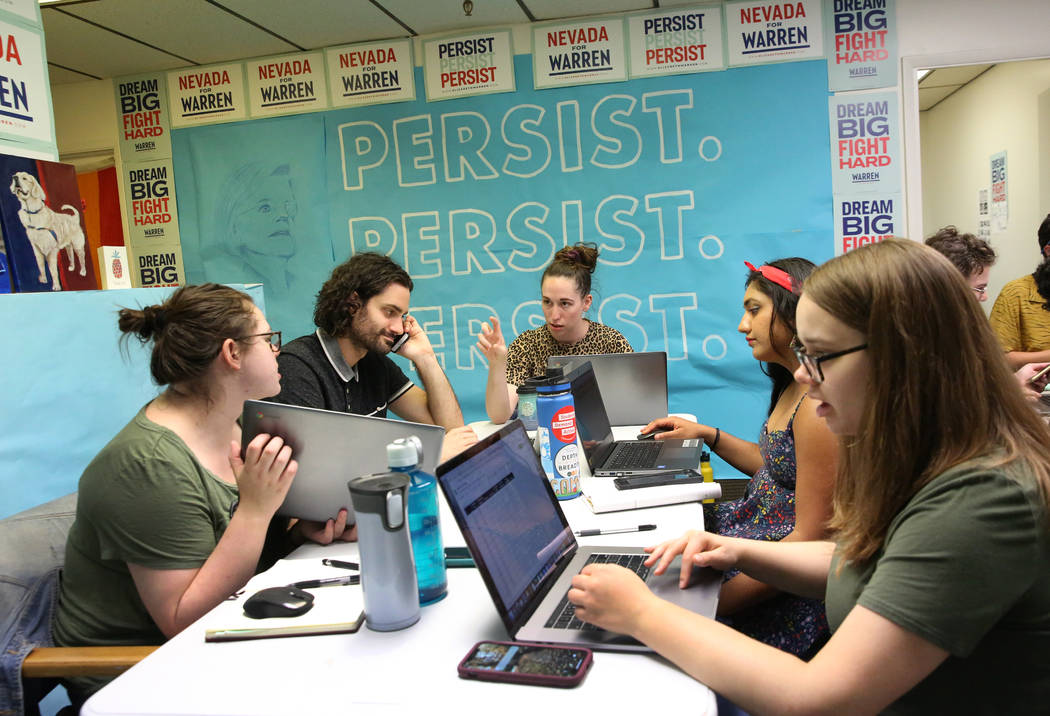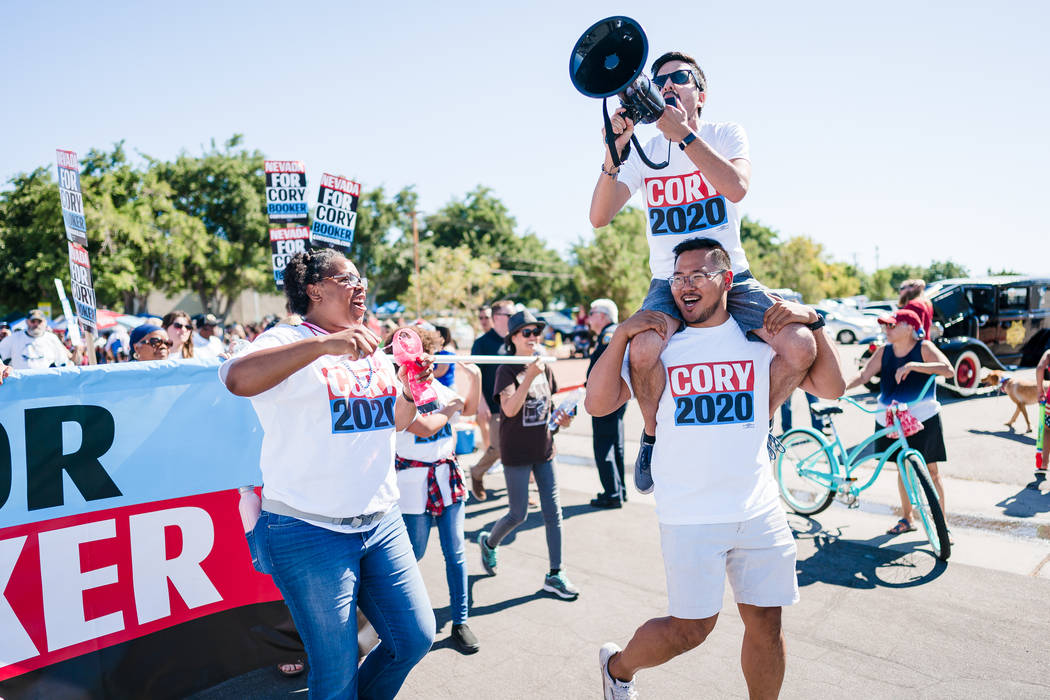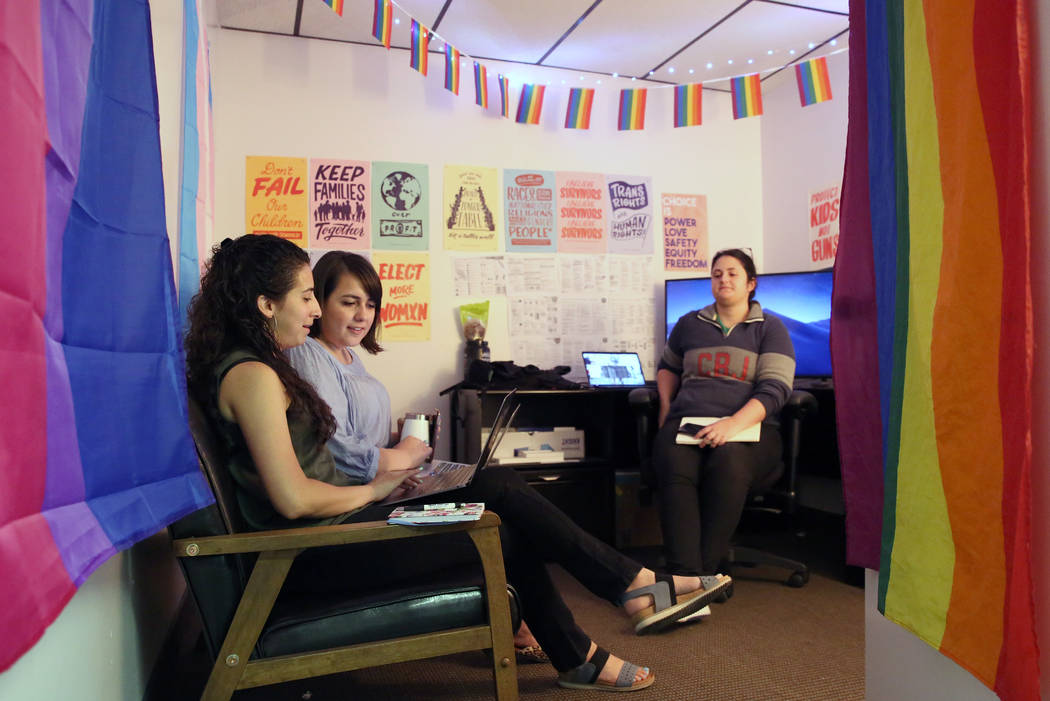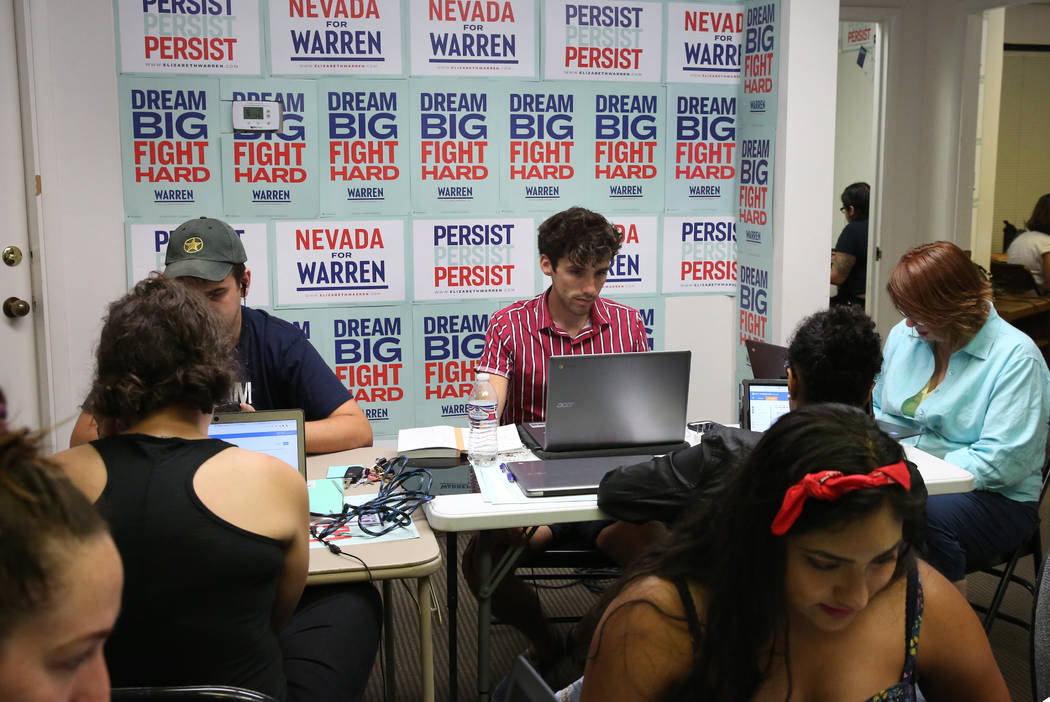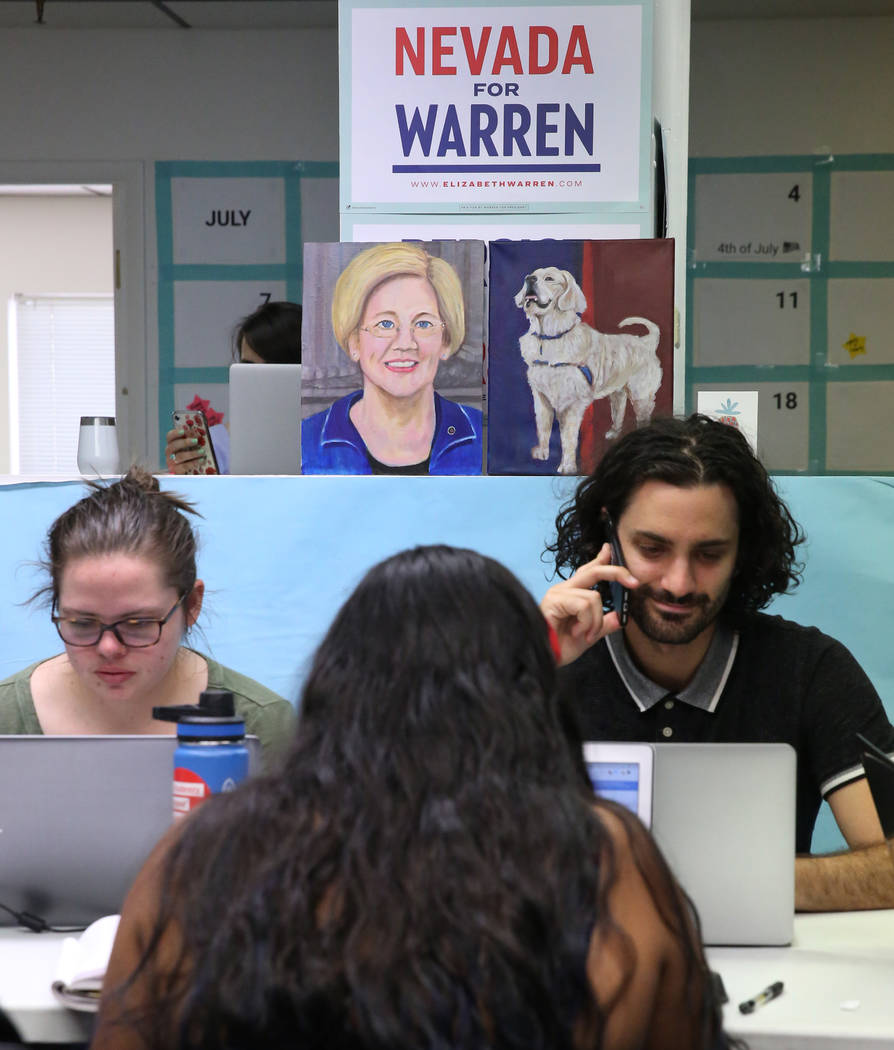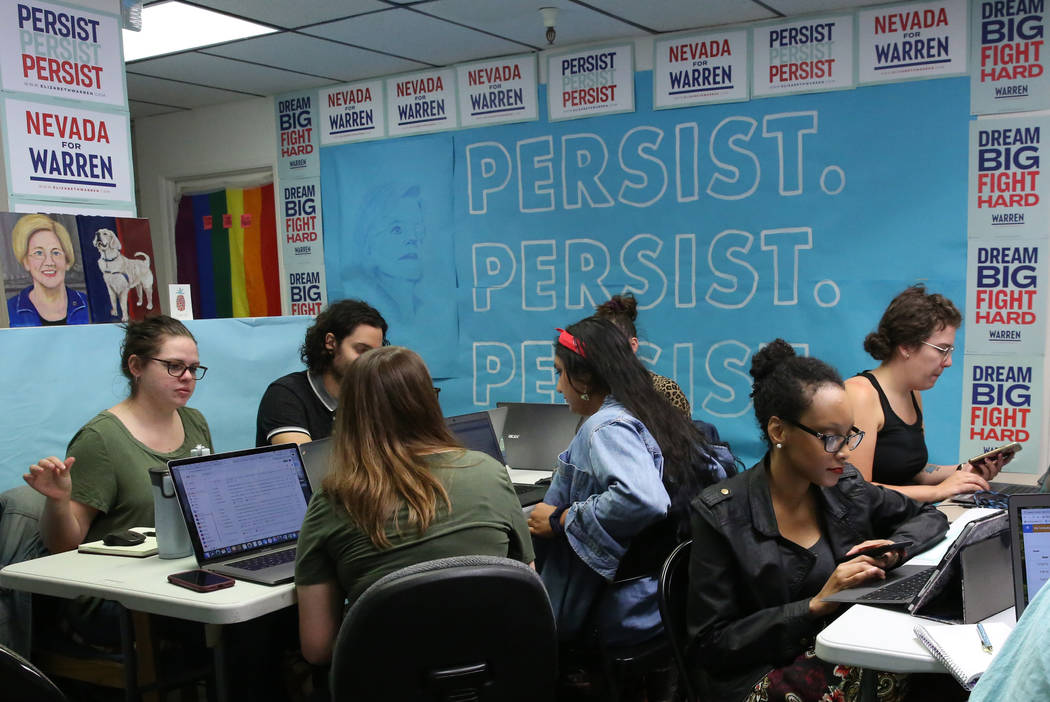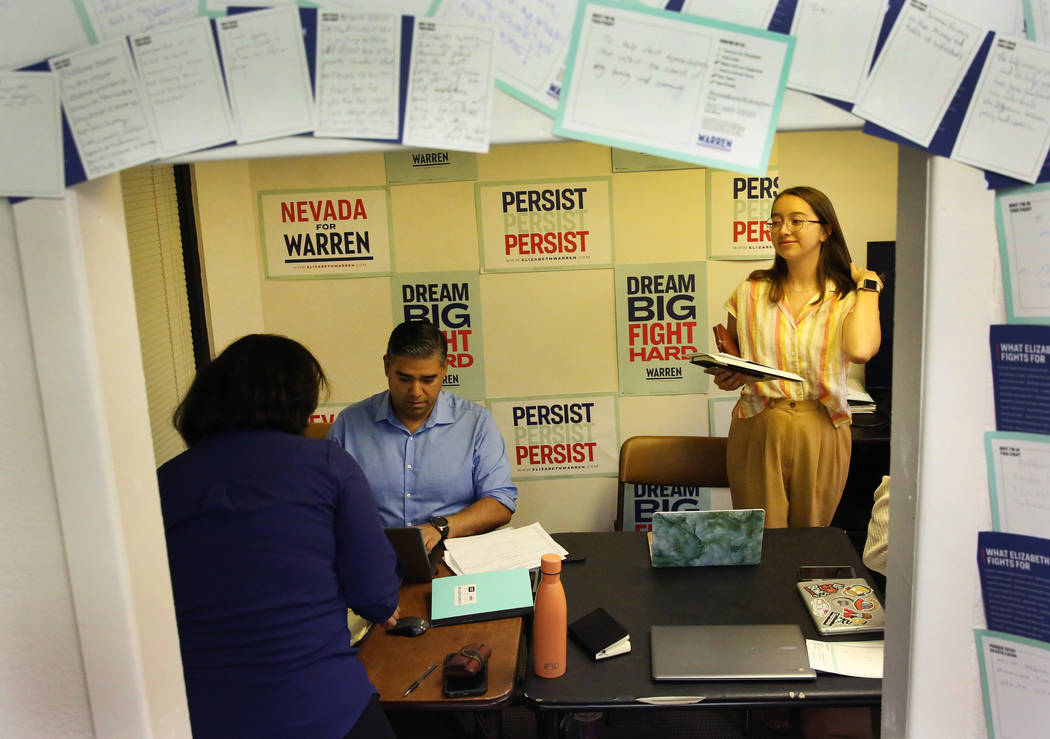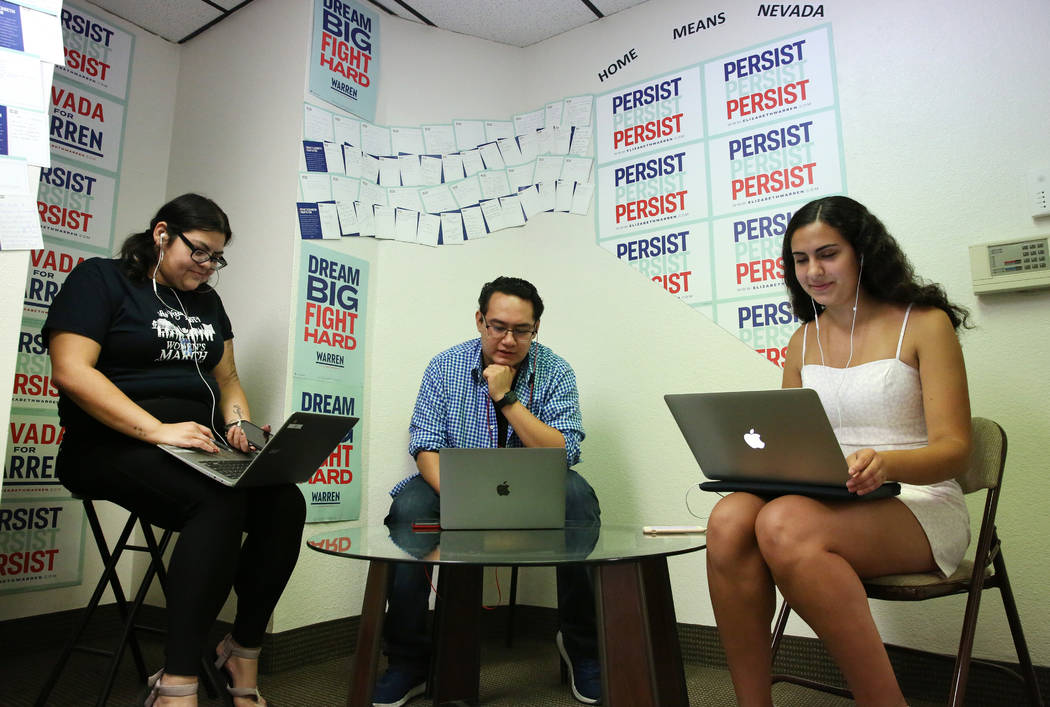Democratic presidential hopefuls compete for staffers, delegates
There are more than seven months until Nevada hosts the third Democratic nominating contest of the 2020 campaign, but a throng of presidential contenders already has unleashed a flood of political operatives into the Silver State.
According to numbers provided by seven of the campaigns with employees on the ground in Nevada — including each of the front-runners in early polls — there are at least 170 full-time staff members in the state as of early July.
The number of bodies within the operations and what each candidate plans to do with them also are as varied as the candidates themselves.
Most arrived in the spring, but one high-profile candidate had someone in place in late January, while another appears to have only started the process in June.
Diversity is the key buzz word, with each campaign seeking to court members of Nevada’s increasingly powerful diverse communities on key issues such as criminal justice reform and immigration.
Some are fighting for name recognition. Others are seeking to remind Nevadans of their long resumes as they make their second or third attempts at the nomination. One of those is eyeing a dominant victory, in Nevada and beyond.
The local campaign workers are friendly with one another. They often are in the same places, making in-person pitches at Las Vegas labor gatherings and immigration rallies. Many have worked together in past cycles. Some interviewed with multiple campaigns before choosing a suitor.
Each campaign denied or sidestepped questions about the difficulties of finding experienced Nevada staff members as their offices collectively swell.
But given the amount of time before the caucus, the flood of cash into the determined candidates’ war chests and the finite number of political operatives with local resumes, an arms race of sorts appears likely to unfold in the coming months.
Sanders
Vermont Sen. Bernie Sanders’ campaign returned to Nevada in 2019 after a fiercely fought 2016 caucus in which he scored 15 pledged delegates to eventual nominee Hillary Clinton’s 20. His staff hopes to use technology to build a lasting infrastructure for future progressive campaigns.
It also is brimming with confidence.
“Our first goal is to win in a landslide victory, both nationally and in Nevada,” state director Sarah Michelsen said. “Another goal is helping the party and other campaigns bring in the largest, most diverse caucus electorate.”
Sanders’ campaign has recruited more than 35 full-time staff members — the first of which arrived in early April. It has not been difficult to recruit qualified staff, Michelsen said, but the campaign is actively looking for more.
Michelsen comes to the campaign after several years supporting progressive campaigns as executive director of Arizona Wins, but several other senior staffers bring Nevada experience in previous cycles.
Senior adviser Peter Koltak was formerly the executive director of the Nevada Senate Democratic Caucus.
Nevada communications director Bianca Recto was an aide to former Senate Majority Leader Harry Reid before joining Sen. Catherine Cortez Masto’s team in 2016.
Nevada field director Susana Cervantes was an east Las Vegas organizer for Barack Obama in 2012, worked for Sanders in Iowa in 2016 and then returned to Nevada in 2018 to organize for the state party.
Sanders, unlike many of his opponents, has spent at least the last four years building name recognition and campaign infrastructure for a presidential run.
He has a mobile application, which Michelsen said allows volunteers to organize without having to enter a field office. There’s an upper tier within the campaign’s volunteer effort called community connectors, who are those volunteers with previous organizing experience and who essentially are relied upon to host their own Sanders events.
Michelsen said her staff hopes to mobilize large numbers of volunteers and activists for the foreseeable future.
“Campaigns often wash in and out like a wave and don’t leave anything behind,” she said. “We’re hoping our organizing will build something that lasts and gives power to progressives for future elections.”
Warren
Massachusetts Sen. Elizabeth Warren entered the presidential fray in February, but her Nevada blitz already was underway.
Nevada state director Suzy Smith began her work in January, campaign spokesman Terrence Clark said, and the local staff has grown to nearly 40 full-time staffers and about 20 paid interns.
Warren’s Nevada crew appears to be both the largest on the ground and the first to hit it. Now, the hard part: Turning that early investment into caucusgoers and, eventually, delegates to the national convention.
“We’re already the biggest,” Clark said. “We want to continue with a large presence and show how important this state is to Elizabeth and the country.”
He continued: “Nevada is the most diverse early state. To beat expectations here would be helpful for both messaging and visibility.”
The campaign is holding house parties that “engage the community from Washoe (County) to Boulder City,” Clark said. Volunteers and supporters are asked to “vote triple” — to bring three friends, neighbors, family members or total strangers with them into the fold.
Diversity among the staff and volunteers is key, Clark said. Every member of the Warren field team based in east Las Vegas, for example, is a Spanish speaker.
Clark said the campaign did not have any difficulty finding staff with local ties. In fact, some of Warren’s top national advisers come bearing Nevada pedigrees.
Her national communications director, Kristen Orthman, and speechwriter, Christopher Huntley, each spent years as Reid aides. Brendan Summers, her delegate adviser, was the executive director of the Nevada Assembly Democratic Caucus for nearly three years before orchestrating Sanders’ Iowa caucusing efforts in 2016.
In Nevada, Smith and political director Michelle Villegas each worked on state campaigns in 2018. Each of the three deputy political directors brings Nevada campaign experience, Clark said, and many of the field organizers are from Las Vegas or Reno.
The focus going forward continues to be as much direct contact with people of color within their communities, Clark said.
Biden
The former vice-president was a somewhat late entry to the 2020 race but did so as the established leader in the polls, both in Nevada and throughout the country. Some recent polls have shown a narrowing gap, but Biden still appears to be the established front-runner going into the Democratic National Committee’s second presidential debate.
Although his staff did not begin arriving until April, Biden appears to have one of the largest presences in Nevada. This is the third time in which he’s organized a presidential campaign, after runs in 1988 and 2008.
Nevada campaign spokesman Vedant Patel said more than 30 full-time employees are currently on the ground, with most of the hires coming in May and June.
A paid internship program for college students also is on the way. The campaign has a “strong presence” on the UNLV and University of Nevada, Reno campuses and is looking to recruit heavily going forward.
“We’re not taking anything for granted,” Patel said.
Like most of the other 2020 Democratic campaigns, Patel said Biden’s overall goal is to create a field team “reflective of the diversity that is Nevada.” Its organizers have specific experience within the state’s African-American, Latino and Asian-American and Pacific Islander (AAPI) communities.
The staff is recruiting new volunteers through roundtable meetings and house parties, Patel said.
Much of Biden’s senior staff in Nevada comes with previous state experience.
State director Hilary Barret was Clinton’s deputy Nevada political director during her 2016 campaign. She also worked for Sen. Catherine Cortez Masto and the state party.
Patel and state organizing director Jennifer Sosa each worked for western region arms of the national party in the 2018 congressional election cycle.
Biden’s Nevada political director, Divya Narala, previously worked for the late Assemblyman Tyrone Thompson during the 2015 and 2017 legislative sessions.
“We want to put all of these pieces together in a way that reminds Nevadans of the vice-president’s long history with the state, of delivering for Nevadans and the American people,” Patel said.
Harris
The campaigns agree that appealing to Nevada’s diverse communities is a key to winning the state, but the local staff for California Sen. Kamala Harris believes it can do one better: Offering a candidate who those community members can see themselves in.
“It does give us an edge,” state director Ernesto Apreza said. “The senator’s background both as an African-American woman and a woman with AAPI heritage is incredibly meaningful to those communities here in the state. There’s an element of shared, lived experience that attract folks to the candidate.”
Harris’ father is from Jamaica, and her mother is from India.
The campaign has built up a staff of 35 and counting. The first arrivals hit the ground in April. It also uses a few interns in the form of a paid fellowship program, Apreza said. The first fellowship group is about to finish, and the campaign hopes to do another, he added.
Staff and organizers have prioritized diverse communities in both the northern and southern parts of the state.
A continued investment in staffing up Nevada is one part of the support structure behind the work, Apreza said.
Another is innovation. The staff held an eight-week online course, dubbed “Camp Kamala,” as a way of training its volunteer base to self-organize.
The final step is the candidate herself, who lives closer to Nevada than most of the other 2020 hopefuls. She has visited as much as anyone has, Apreza said, and will continue to do so.
The local staff also brings a considerable amount of Nevada campaigning experience.
Apreza organized in east Las Vegas for Obama’s 2012 campaign before working for Clinton’s campaign in Colorado.
Senior adviser Megan Jones has worked on Nevada campaigns, including many Reid re-election bids, since 1998.
Communications director Helen Kalla recently joined the campaign from Gov. Steve Sisolak’s office. She previously ran communications for the state party during the 2018 cycle.
By the campaign’s count, the staff has worked a combined 25 election cycles within Nevada.
Booker
New Jersey Sen. Cory Booker’s Nevada campaign staff knows it has to overcome the strong name recognition of Biden and Sanders in order to carve a way to the nomination. It’s why Booker himself has prioritized spending time introducing himself to voters in restaurants, stores, churches and homes in addition to publicized campaign events.
“Our short term goal is to continue to introduce Cory Booker to a lot of people,” Nevada spokeswoman Vanessa Valdivia said. “I think what we’ve seen is that the more people know Cory and get to know him, the more they like him.”
The campaign has hired nearly 20 full-time staffers since first touching down in April, Valdivia said, with a focus on a diversity reflective of the state. About 60 percent of the staff are women, and 60 percent identify as ethnically diverse, with African-American, AAPI and Latino communities represented.
State director Phil Kim is AAPI and has worked as an organizer within that community for years. The team’s data director, Cheska Perez, also is AAPI and a recipient of Deferred Action for Childhood Arrivals (DACA).
About 60 percent of the staff also has experience working Nevada caucuses, Valdivia said. Some of the employees and volunteers for other 2020 campaigns previously worked for her in 2016, when she was an east Las Vegas organizer for Clinton’s campaign before eventually becoming Latino Vote Director for Clinton after the caucus.
Regional organizing director Alex Kania, based in Northern Nevada, organized for the state party in 2018.
Booker’s staff also has made appealing to faith organizations a priority, particularly the large African-American faith communities in North Las Vegas. Booker, who is African-American, comes from a religious family, and his mother, Carolyn, lives in Summerlin.
Like Sanders’ staff, Booker’s campaign hopes to “leave communities better than we found them” in terms of building organizational infrastructure that allows more people to participate in the caucus and politics going forward.
The campaign is hopeful that increased organizing, outreach and introductions will allow Booker to form a more stable foothold in Nevada. According to a June Nevada poll conducted by Monmouth University, only 2 percent of respondents said they would support Booker if the caucus were held that day.
But Kim, the state director, stressed that the campaign believes it is on the same level as that of Warren, Sanders and Biden. With such a large field, a single caucusgoer could make a difference in the fight for the state’s 36 pledged delegates, and his team plans to fight for each one.
“We’re going to see a lot of campaigns move ahead, and we count ourselves in that pack,” Kim said. “We want to make sure we’re growing appropriately with the other campaigns and continuing to build those strong community relationships.”
Moulton
Rep. Seth Moulton of Massachusetts also has a name-recognition mountain to climb. And unlike Booker, Moulton entered the race far later than the pack and did not participate in the first national debate.
But that hasn’t stopped Moulton from making five cross-country trips to Nevada since declaring his candidacy in late April.
“Nevada is extremely important and a high priority for us,” said Matthew DeFalco, Moulton’s state director.
Moulton, an Iraq War veteran, is making a particular push for support from veterans.
“He’s led troops on the field,” DeFalco said. “And that appeals and speaks to veterans in a way that’s missing from the rest of the field and has been missing from Democratic politics for a long time.”
DeFalco was Moulton’s only Nevada staff member during his first two months on the trail, but the staff has since added two more full-time employees and a handful of interns. DeFalco is a former Reid intern who also worked on Obama’s re-election campaign in 2012 and several Nevada ballot question campaigns in more recent elections.
Moulton and his campaign staffers have expressed frustration over being “denied” a place at the debates. DeFalco said Moulton has met the qualifications in several polls, but the national party refuses to honor them.
“He needs to be up there and part of this process,” DeFalco said. “The (Democratic National Committee) shouldn’t be the one to decide this election. But we’re working hard, because people in this state will ultimately choose who they want regardless of the debates.”
Buttigieg, Castro, O’Rourke and others
Other presidential campaigns that appear to have staff in Nevada either did not respond to interview requests, could not accomodate those requests before deadline or refused to share any specifics.
The campaign for South Bend, Indiana, Mayor Pete Buttigieg was not able to find time for an interview, but spokeswoman Marisol Samayoa said the Nevada staff consists of 13 full-time employees.
In a statement, Buttigieg’s campaign said it had “quickly transitioned to a top-tier presidential campaign.” It has built a “strong, diverse team” in Nevada and is “encouraged by the response we’ve gotten from voters all over Nevada.”
Buttigieg has enjoyed national media darling status, rising to a top-five finisher in many national and Nevada polls. He raised nearly $25 million in the second quarter of 2019 alone.
However, his first Nevada staff members appear to have only touched down last month, and they have not been nearly as visible at noteworthy Democratic events as other, less-funded campaigns.
The campaigns of former Texas Rep. Beto O’Rourke and Minnesota Sen. Amy Klobuchar were reached, but neither agreed to an interview or provided any statements before deadline.
Campaigns for author Marianne Williamson and New York Sen. Kirsten Gillibrand could not be reached for comment.
Former Housing and Urban Development Secretary Julian Castro has an active Nevada staff and visited West Wendover, Elko and Reno on July 6, but his campaign refused to share any specifics on its efforts within the state.
Contact Rory Appleton at rappleton@reviewjournal.com or 702-383-0276. Follow @RoryDoesPhonics on Twitter.



